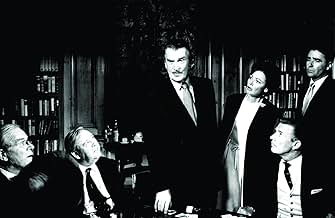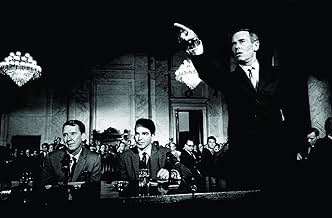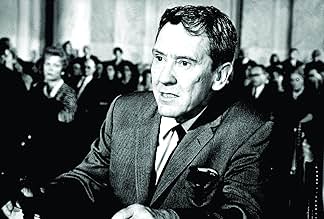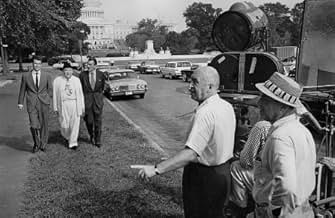VALUTAZIONE IMDb
7,7/10
7849
LA TUA VALUTAZIONE
Aggiungi una trama nella tua linguaThe polarizing search for a new Secretary of State has far-reaching consequences.The polarizing search for a new Secretary of State has far-reaching consequences.The polarizing search for a new Secretary of State has far-reaching consequences.
- Nominato ai 1 BAFTA Award
- 1 vittoria e 2 candidature totali
Recensioni in evidenza
Although I had seen it when it first came out (I was 18) and again about about 6 months ago (Winter, 2004), this screening (May, 2005) was even more insightful.
It really has aged very well, and is, obviously, at least as relevant today as it was in 1962 --"realistic" in its depiction of the congressional situation in its own day, positively prescient in its relation to our own.
Fonda is good, but curiously second fiddle to the other, more subtle characters.
It's Walter Pigeon's best flick (by far), well cast as the Senate Majority Leader and he carries the role off with an almost Shakespearean aplomb.
Almost Charles Laughton's best (only because that's a very hard call), with his hopelessly crumpled white suit and hat, shufflin' gait, positively Irvinesque homespun witticisms and wonderful, drawling, contemptuous "Mis-ter Rob-ert A. Leff-in-well".
Might be Franchot Tone's best, as well, as the ailing, frail, chain-smoking president, a little bit too close to Life (filmed 6 years before he died of lung cancer).
Gene Tierney is very good as the D.C. socialite hostess "Dolly Harrison" --a character clearly based on Averill Harriman's wife Pamela or, as a type, a later Katherine Graham.
Definitely Peter Lawford's best film --which, admittedly, is not saying much, but he's very well cast as a rather dissolute, philandering Kennedyesque senator who is, nonetheless, not without his Qualities.
Lew Ayres' Casper Milquetoast "Vice President Harley M. Hudson" is an excellently wrought character, from his "bucket of warm spit" role as the impotent President of the Senate to the wonderful twist he gives it at the end, which expounds quite beautifully the subtleties and definitiveness of the Reality of Power.
The scenes of D.C. are positively nostalgic --imagine anyone being able to catch a cab to the capital and then walk right up the steps and go inside ; or an aged night-watchman making his rounds as *the* Security for the inside of the Senate building.
As are the various aspects of the underground "Gay Scene" in NYC with the wonderfully cast Larry Tucker, Jerry Fielding's fine music and "the voice of Frank Sinatra" (as credited). (Some might object to the "clichés" in these scenes, but, to me, those clichés are part and parcel of the ambiance of the period of the film and the culture it portrays and should be seen as such --rather like appreciating the overt racism in "Birth of a Nation" for what it is. I am glad that Preminger didn't "sanitize" his presentation of this matter, especially given the crucial nature of it to the plot of the film.)
But the contrast between the civility --albeit occasionally a rather raw one-- of the senate of circa 1960 and that of the present day is not nostalgic quite so much as it is just heart-rending ("The World We Have Lost"), and the roots of our present grotesque, take-no-prisoners congressional savagery are fully exposed in the intertwined plot lines of McCarthyesque ideological rigidity and homosexual blackmail.
All in all, a "Roman à Clef" to the political world of 1960's Washington, vividly relevant to our own time.
It really has aged very well, and is, obviously, at least as relevant today as it was in 1962 --"realistic" in its depiction of the congressional situation in its own day, positively prescient in its relation to our own.
Fonda is good, but curiously second fiddle to the other, more subtle characters.
It's Walter Pigeon's best flick (by far), well cast as the Senate Majority Leader and he carries the role off with an almost Shakespearean aplomb.
Almost Charles Laughton's best (only because that's a very hard call), with his hopelessly crumpled white suit and hat, shufflin' gait, positively Irvinesque homespun witticisms and wonderful, drawling, contemptuous "Mis-ter Rob-ert A. Leff-in-well".
Might be Franchot Tone's best, as well, as the ailing, frail, chain-smoking president, a little bit too close to Life (filmed 6 years before he died of lung cancer).
Gene Tierney is very good as the D.C. socialite hostess "Dolly Harrison" --a character clearly based on Averill Harriman's wife Pamela or, as a type, a later Katherine Graham.
Definitely Peter Lawford's best film --which, admittedly, is not saying much, but he's very well cast as a rather dissolute, philandering Kennedyesque senator who is, nonetheless, not without his Qualities.
Lew Ayres' Casper Milquetoast "Vice President Harley M. Hudson" is an excellently wrought character, from his "bucket of warm spit" role as the impotent President of the Senate to the wonderful twist he gives it at the end, which expounds quite beautifully the subtleties and definitiveness of the Reality of Power.
The scenes of D.C. are positively nostalgic --imagine anyone being able to catch a cab to the capital and then walk right up the steps and go inside ; or an aged night-watchman making his rounds as *the* Security for the inside of the Senate building.
As are the various aspects of the underground "Gay Scene" in NYC with the wonderfully cast Larry Tucker, Jerry Fielding's fine music and "the voice of Frank Sinatra" (as credited). (Some might object to the "clichés" in these scenes, but, to me, those clichés are part and parcel of the ambiance of the period of the film and the culture it portrays and should be seen as such --rather like appreciating the overt racism in "Birth of a Nation" for what it is. I am glad that Preminger didn't "sanitize" his presentation of this matter, especially given the crucial nature of it to the plot of the film.)
But the contrast between the civility --albeit occasionally a rather raw one-- of the senate of circa 1960 and that of the present day is not nostalgic quite so much as it is just heart-rending ("The World We Have Lost"), and the roots of our present grotesque, take-no-prisoners congressional savagery are fully exposed in the intertwined plot lines of McCarthyesque ideological rigidity and homosexual blackmail.
All in all, a "Roman à Clef" to the political world of 1960's Washington, vividly relevant to our own time.
Allen Drury's sprawling novel of Washington intrigue gets a bit over-condensed in Wendell Mayes' screenplay--the exposition comes fast and furious and unconvincing, and some important subplots in the book, such as the space race, are altogether missing. But what's left is pretty juicy and compelling, as Secretary of State nominee Henry Fonda (top-billed, but with surprisingly little screen time) sets off a destructive round of politicking that ends in death, destruction, and satisfying upholding of the Constitution. Preminger handles the gay subplot with as little subtlety as you'd expect, and while he was clearly trying to show some sympathy to an oppressed minority, he comes off as a square homophobe. Don Murray is oversold as an Ideal Husband and Father to artificially ratchet up the poignancy, and as his wife, Inga Swenson just cries and cries, and seems a shrew and a scold. But the dialog is sharp, even with all the overexposition, and the cast is wonderful: Peter Lawford as a Kennedy-esque Rhode Island senator, Burgess Meredith as a weak witness, George Grizzard as a Roy Cohn-like meddler, Gene Tierney as Pamela Harriman more or less, Charles Laughton as a tasty-ham Southern senator, Lew Ayres as a Vice President with hidden strength, Franchot Tone as the horse-trading President, and Walter Pidgeon as the sort of Majority Leader Nancy Pelosi or Harry Reid should aspire to be. Even such solid character actors as Paul Ford, Russ Brown, and Betty White turn up in tiny parts. The cinematography's clean and uncluttered, and while this congressional bunch is far more articulate and epigrammatic than our own, the theme of backstage double-dealing feels more relevant than ever. Very fast-moving, and dated as it is, it still packs a wallop.
Peter Bogdanovich once said that "Advise and Consent" is the greatest political film made in America and he could be correct. Preminger's 1962 masterwork is a gripping opus with a outstanding cast, masterly use of widescreen, and beautiful, almost hallucinatory black-and-white photography. Adapted from a novel by Allen Drury by Wendell Mayes, it recounts a US Senate committee's ongoing hearing on a controversial appointment by the President (Franchot Tone) for Secretary of State (Henry Fonda) which leads to a blackmailing of a senator from Utah (Don Murray). While I enjoyed all the performances by the top-notch cast, the stand-out performance, I think, is Charles Laughton's final turn as Senator Cooley from South Carolina, a pudgy, delightfully creepy politician who is resolutely opposed to the nomination and does what he can to stop it. The ending really surprised me, but it is not that injurious to the perceptive & emotional drama at the heart of this immensely satisfying film. Together with "Bunny Lake is Missing" & "Exodus", this is arguably Preminger's best film of 1960s.
A brilliant adaptation of a known bestseller dealing with politic intrigues and plenty of familiar faces formed by an all-star-cast who gives extraordinary acting . Senate investigation into the President's newly nominated Secretary of State , gives light to a secret from the past , which may not only ruin the candidate , but the President's character as well. Then the USA senate presided by the Vice President (Lew Ayres) at is called upon to confirm the controversial nominee by President (Franchot Tone) for Secretary of State (Henry Fonda) . But the nominee is accused as communist by Herbert Gelman (Burguess Meredith ,in real life, he was himself named an "unfriendly witness" by the House Un-American Activities Committee, which nearly ruined his career and Will Geer, who plays the Senate minority leader, was also blacklisted for refusing to name names before the same Committee) , he testifies against Leffingwell at the latter's confirmation hearing, claiming that the two of them were members of a Communist cell . A Southern Senator (flamboyant acting by Charles Laughton) strongly opposes himself the appointment . Meantime , a senator (Don Murray) is blackmailed (the blackmail attempt is based on the case of Wyoming Senator Lester C. Hunt, who was blackmailed by members of the Republican Party).
Gripping and long movie that contains over-the-top performances, engrossing drama , intrigue , corruption , political events and a special vision of US Senate and its behind-the-scenes Washington . Thought-provoking and stimulating film in which abounds top-drawer acting among the popular stars ; interesting screenplay from Allen Drury bestselling novel wheeling with a suspenseful intrigue about a controversial senator promoted to Secretary of State . When Allen Drury was writing the novel , John F. Kennedy, upon whom the character Senator Lafe Smith was based, was a young Senator with ambitions to be President. When the movie came out Kennedy was President, and Lafe Smith was played by Peter Lawford who was, at that time, married to Kennedy's sister Patricia . Main and support cast are very fine , there abounds magnificent performances as Don Murray , Paul Ford , Walter Pidgeon , Peter Lawford , Gene Tierney , Edward Andrews , Malcolm Atterbury and Franchot Tone , among others . Fascinating interpretation by Charles Laughton at his final movie , easily the most stimulating acting . Furthermore , stands out Henry Fonda who gives an adequate underplaying and the scene-stealing best , George Grizzard . Good production design by Lyle Wheeler , for the scenes taking place inside the US Senate, Columbia dusted off its senate set built for Mr Smith Goes to Washington. Appropriate cinematography in Panavision by Sam Leavitt , though also there is a horrible version being shown in computer-colored . Atmospheric and appropriate musical score by Jerry Fielding .
This engrossing , riveting picture was effective and compellingly directed by Otto Preminger . At the beginning he became a stage director and subsequently a notorious secondary actor . Otto directed several films , nowadays many of them are considered as classic movies . He made ¨Laura¨ that was released in 1944 and Preminger ranked as one of the top directors in the world . He realized all kind of genres as Court drama such as the great success ¨Anatomy of a murder¨, ¨Court martial of Billy Mitchell¨ , Noir film as ¨Laura¨ which made him an A-list director in Hollwyood , ¨Angel Face¨ , ¨Man with a golden arm¨, Religious drama as ¨The Cardinal¨ , Musical as ¨Porgy and Bess¨, ¨Carmen Jones¨ , Western as ¨River with no return¨ and historical as ¨Saint Joan¨, ¨Exodus¨ though also had some flop as ¨Rosebud¨ getting scathing reviews , though with ¨The human factor¨ won him respectful notices . However , his powers began to wane after and by the end of the decade of the 60s he was considered washed-up . ¨Advise and Consent¨ resulted to be one of the his best films . Rating : Better than average , Worthwhile watching .
Gripping and long movie that contains over-the-top performances, engrossing drama , intrigue , corruption , political events and a special vision of US Senate and its behind-the-scenes Washington . Thought-provoking and stimulating film in which abounds top-drawer acting among the popular stars ; interesting screenplay from Allen Drury bestselling novel wheeling with a suspenseful intrigue about a controversial senator promoted to Secretary of State . When Allen Drury was writing the novel , John F. Kennedy, upon whom the character Senator Lafe Smith was based, was a young Senator with ambitions to be President. When the movie came out Kennedy was President, and Lafe Smith was played by Peter Lawford who was, at that time, married to Kennedy's sister Patricia . Main and support cast are very fine , there abounds magnificent performances as Don Murray , Paul Ford , Walter Pidgeon , Peter Lawford , Gene Tierney , Edward Andrews , Malcolm Atterbury and Franchot Tone , among others . Fascinating interpretation by Charles Laughton at his final movie , easily the most stimulating acting . Furthermore , stands out Henry Fonda who gives an adequate underplaying and the scene-stealing best , George Grizzard . Good production design by Lyle Wheeler , for the scenes taking place inside the US Senate, Columbia dusted off its senate set built for Mr Smith Goes to Washington. Appropriate cinematography in Panavision by Sam Leavitt , though also there is a horrible version being shown in computer-colored . Atmospheric and appropriate musical score by Jerry Fielding .
This engrossing , riveting picture was effective and compellingly directed by Otto Preminger . At the beginning he became a stage director and subsequently a notorious secondary actor . Otto directed several films , nowadays many of them are considered as classic movies . He made ¨Laura¨ that was released in 1944 and Preminger ranked as one of the top directors in the world . He realized all kind of genres as Court drama such as the great success ¨Anatomy of a murder¨, ¨Court martial of Billy Mitchell¨ , Noir film as ¨Laura¨ which made him an A-list director in Hollwyood , ¨Angel Face¨ , ¨Man with a golden arm¨, Religious drama as ¨The Cardinal¨ , Musical as ¨Porgy and Bess¨, ¨Carmen Jones¨ , Western as ¨River with no return¨ and historical as ¨Saint Joan¨, ¨Exodus¨ though also had some flop as ¨Rosebud¨ getting scathing reviews , though with ¨The human factor¨ won him respectful notices . However , his powers began to wane after and by the end of the decade of the 60s he was considered washed-up . ¨Advise and Consent¨ resulted to be one of the his best films . Rating : Better than average , Worthwhile watching .
Advise & Consent is a fascinating look at the inner workings of the United States Senate. I like the exploration of both the formality of proceedings when they are in session and the informality of what can go on behind the scenes. All the back-stabbing and secret deals that we see in the film kept me on my toes. I never knew which way this story was headed, and that's always refreshing. I also find it fascinating that almost 60 years ago they were also dealing with some of the difficulties that come with our two-party system, and had to confront the fact that personal vendettas and pettiness can get in the way of Senators doing what their constituents might actually desire. It's more than a little depressing because it doesn't fill me with much hope for our nation when we are stuck in these troubling times, but at least seeing it played out in a film this way feels informative.
Advise & Consent is a real ensemble piece. There are times when we will follow one character for a few minutes to see the part they would play in this vote, but it never locks in on one person long enough to have a true protagonist. This added to the element of surprise, making it even harder to predict which way the story might go. There were a number of powerful scenes that I loved, and those made up for some of the slower scenes where it felt like we were getting stuck in the tedium of Senate procedures. I did find that the end of the film was a bit too convenient, which made it seem contrived. It's certainly the appropriate Hollywood ending, but in real life it is rare that things would time out as perfectly as we see here. That being said, the story of Advise & Consent is still a good one, and this film feels entertaining and maybe just a little educational at the same time.
Advise & Consent is a real ensemble piece. There are times when we will follow one character for a few minutes to see the part they would play in this vote, but it never locks in on one person long enough to have a true protagonist. This added to the element of surprise, making it even harder to predict which way the story might go. There were a number of powerful scenes that I loved, and those made up for some of the slower scenes where it felt like we were getting stuck in the tedium of Senate procedures. I did find that the end of the film was a bit too convenient, which made it seem contrived. It's certainly the appropriate Hollywood ending, but in real life it is rare that things would time out as perfectly as we see here. That being said, the story of Advise & Consent is still a good one, and this film feels entertaining and maybe just a little educational at the same time.
Lo sapevi?
- QuizDirector Otto Preminger offered the role of a Southern senator to Martin Luther King Jr., believing that the casting could have a positive impact (despite the fact that there were no black senators at the time). King declined after serious consideration, as he felt playing the role could cause hostility and hurt the civil rights movement.
- BlooperWhen the roll call vote is being conducted on the motion to advise and consent to Leffingwell's nomination, Senator Van Ackerman's name is not called. Even though he had left the Senate Chamber, the clerk would still have called his name.
- Citazioni
Johnny Leffingwell: The phone - Senator Munson.
Robert Leffingwell: Tell him I've gone out.
Johnny Leffingwell: Why?
Robert Leffingwell: Because, Johnny, he'll want to do some things that might obligate me.
Johnny Leffingwell: I mean why do you want me to lie? If you're in, you're in; if you're out, you're out.
Robert Leffingwell: Son, this is a Washington, D.C. kind of lie. It's when the other person knows you're lying, and also knows you *know* he knows. You follow?
- Versioni alternativeAlso available in a computer colorized version.
- ConnessioniFeatured in Henry Fonda: The Man and His Movies (1982)
- Colonne sonoreThe Song from Advise and Consent
Music by Jerry Fielding
Lyrics by Ned Washington
Sung Frank Sinatra - voice on juke box
I più visti
Accedi per valutare e creare un elenco di titoli salvati per ottenere consigli personalizzati
Dettagli
- Data di uscita
- Paese di origine
- Sito ufficiale
- Lingua
- Celebre anche come
- Advise & Consent
- Luoghi delle riprese
- Columbia/Sunset Gower Studios - 1438 N. Gower Street, Hollywood, Los Angeles, California, Stati Uniti(Studio, Senate Chamber - interiors)
- Aziende produttrici
- Vedi altri crediti dell’azienda su IMDbPro
- Tempo di esecuzione2 ore 19 minuti
- Colore
- Proporzioni
- 2.35 : 1
Contribuisci a questa pagina
Suggerisci una modifica o aggiungi i contenuti mancanti

Divario superiore
By what name was Tempesta su Washington (1962) officially released in India in English?
Rispondi





































